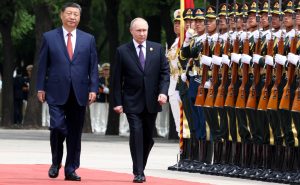The official state visit of Russian President Vladimir Putin to China on May 16 and 17 sent shockwaves across the world. Front pages the world over were laminated with photos of the red carpet and guard of honor. It was a historic summit, not least judging by the large Russian delegation, which included almost everyone with major political and economic weight accompanying Putin.
Most analysts quickly focused on the immediate – and somewhat inferred – possibility of a Sino-Russian entente formalizing to affect the frontlines in Ukraine. However, the summit set in motion much more important, longer-term changes to the world architecture.
The three major wheels set in motion are cooperation on infrastructure, consolidation of Eurasian institutions and security alignment, and Russia officially positioning itself against AUKUS. These point to the summit was in fact not aimed at Ukraine, but instead saw China and Russia take the initiative to create a “new era” of a “just world order,” as their lengthy joint statement put it.
In terms of infrastructure, the most important part of the summit was Russia and China formalizing cooperation on the Arctic. The Arctic is the number two priority for the Russian Foreign Policy Concept, standing ahead of China and India. Russia opening up the extremely sensitive region, and formally commencing the development of the Northern Sea Route with China is a sign of deep strategic trust and long-term intentions.
Besides the obvious cost and speed benefits, the Northern Sea Route, if brought into operation, negates China’s geostrategic disadvantage of having trade routes pass through sea lanes controlled by U.S. allies. With the understanding reached regarding the Arctic, China will transport goods via one friendly jurisdiction using a route 30-40 percent shorter than alternatives.
China-Russia Arctic cooperation also has a military dimension. Not only are NATO’s newest members, Sweden and Finland, Arctic states, but Russia has been forced out of relevant multilateral organizations, finding itself under mounting pressures across its northern flank. Thus, the entente with China in the Arctic is thus perhaps more significant than the current priority of Ukraine.
Second, in addition to pledging to deepen alignment between Eurasian integration projects, namely the Eurasian Economic Union (EAEU), Belt and Road Initiative (BRI), and Shanghai Cooperation Organization (SCO), the joint communique included one crucial detail: Russia and China will now work together within U.N. fora on “solving the issue of use of AI for military needs.”
This small detail is consequential – it comes after the United Kingdom stated that it will “increase investment in AI-enabled military capability options” in doctrinal documents. And the U.K. is one of the main Russia hawks globally, with Foreign Secretary David Cameron being one of the first to encourage Ukraine to strike targets in Russia using Western tech.
The issues of increasing Euroatlantic consolidation and weaponization of tech have finally pushed China and Russia to intertwine – this is a significant paradigm shift. Russia and China have agreed to formally cooperate within global fora.
Finally, Russia and China formally stating that AUKUS – the new trilateral alliance of Australia, the United Kingdom, and the United States – causes “grave concern” for the strategic stability of the region is a serious signal and a first from Russia. Indeed, when SEATO formed in 1954 as a mechanism to “prevent communism from gaining ground,” what followed was a bloody tug of war, where the Soviet Union and China had an understanding in terms of aiding communist regimes in Laos, Cambodia, and Vietnam.
It seems that the formation of AUKUS is causing history to rhyme, and the two major Eurasian superpowers are signaling their readiness to resist another U.S.-led alliance bloc.
In short order after the state visit to China, Putin convened the heads of the military-industrial complex, went to Belarus then Uzbekistan. He warned, again, that “constant escalations will have grave consequences.” Such bold moves are a signal of confidence, and that the changes underway today really are long term.
So, while Ukraine dominates headlines, it is Russia’s pivot to Asia that will be the long-term gamechanger. In fact, Andrei Klimov, senator and chair of the BRICS committee and deputy chair of the Foreign Affairs Committee in the Russian Federation Council, said in a recent interview that Russia really is preparing for action in Asia. Klimov summarized this by saying that “a new epoch is being born.”

































